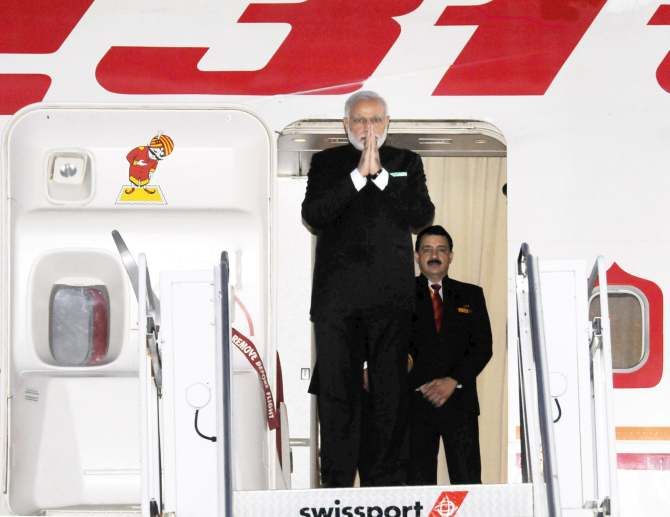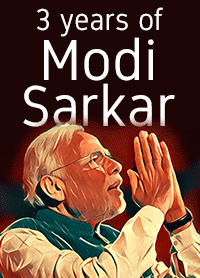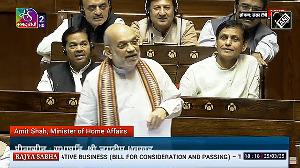'The success or otherwise of Modi's foreign policy will largely depend on the equation he is likely to strike with Donald Trump,' says Ambassador T P Sreenivasan.

A device that many playwrights use to either complicate matters or to resolve a difficult plot is deus ex machina or god from the machine, so called because the concerned character comes to the stage from the roof with the help of a pulley.
Such a phenomenon has appeared in Prime Minister Narendra Modi's successful journey in foreign policy towards the end of his three years in office.
The arrival of Donald Trump on the world scene has transformed international relations beyond recognition and his impact will be of great significance on Modi's foreign policy moves.
The success or otherwise of Modi's foreign policy will largely depend on the equation he is likely to strike with Trump.
Given Trump's mercurial character, there is no guarantee that he will build on the foundations laid by Modi and Obama.
Modi's sterling achievement in his first three years was the way he brought India-US relations from the rock bottom of the roller coaster to its pinnacle.
Setting aside issues like the denial of a US visa to himself and the Devyani Khobragade incident, Modi went right ahead to strengthen the strategic relationship and to expand it further into closer cooperation in the Asia Pacific and to close defence cooperation.
He sought to cut the Gordian knot of the liability law issue to enhance nuclear cooperation in accordance with the historic nuclear deal, which the BJP had opposed and countered with the liability law.
During his fourth visit to the US, he announced in the US Congress in 2016 that henceforth the world would hear a new symphony in India-US relationship.
Obama echoed the same sentiments and began co-designing and co-producing advanced military equipment with India.
Obama called Modi a man of action and the latter came close to being named Time's Man of the Year.
 The arrival of the deus ex machina on January 20, 2017 was as dramatic, unexpected and inevitable as it used to happen in the theatre.
The arrival of the deus ex machina on January 20, 2017 was as dramatic, unexpected and inevitable as it used to happen in the theatre.
The BJP camp, which had counted on Obama's reincarnation in female form, was as surprised by the advent of Trump as the majority of psephologists.
They started counting their blessings in terms of his hatred of Islamic terrorism, allergy towards China, inclination towards Russia, love of business and affinity to his Hindu fundraisers.
It was hoped that his migration policies would not come in the way of the deployment of our IT personnel in the US in large numbers.
A Trump-Modi meeting was anticipated to establish a new equation between the two men, who had appeared to share decisiveness, rightist policies, business mindedness and courage, to carry the new symphony forward.
But the freeze that descended on the international scene had its impact on India.
Except for a phone call and meetings at lower levels, there is no sign of extensive and intensive interaction between the two countries. Nor is there a date for their meeting in sight.
As Trump began to move on to the international scene, many myths were shattered.
Russia became a dreaded ghost in a scandal, which could lead to a first step towards impeachment.
The North Korean threat to blow up the world transformed China from an adversary and a currency manipulator to a partner.
Trump gave a message of peace to the Muslim world, not from Cairo, as Obama did, but from the land of the Holy Mosques itself.
Islamic terrorism was downgraded to Islamist extremism.
Not a word was spoken in public about human rights issues.
Migration control began to affect Indian IT personnel.
The method in the madness of the election campaign gradually emerged.
US foreign policy appeared to return to its traditional moorings. The expectation today is not that Trump would bring in new dynamism, but that the traditional comfort level between India and the US would be maintained.
The best hope is that at their first meeting, Modi and Trump would strike an equation.
The terrible mess that our neighbourhood has become at the beginning of the fourth year of the Modi government may have nothing to do with the Trump phenomenon.
But the hardline stand that China and Pakistan take with India may be the result of confidence on their part that neither the US nor Russia would go out of their way to side with India.
News has just come that the Trump administration has proposed to give Pakistan $800 million as reimbursement for its military and logical support in counter terrorism operations in the next fiscal year.;
India has also become tough with them as evidenced by the worsening situation on the Pakistan border and the Indian boycott of the Chinese OBOR Summit.
Modi's vision of cooperation with neighbours lie shattered as China has considerably enhanced its influence over them.
His effort to build a SAARC without Pakistan might end up in a SAARC without India under China's tutelage.
The recent launch of a satellite for use by South Asian countries other than Pakistan was a diplomatic coup, but there is fear that it might become a white elephant, with the countries in the region not having the technology or the ground facilities to make use of the satellite.
Moreover, some of them already have arrangements with China or some of the European countries for use of satellites. Whether ISRO will be able to replace them is a matter to be seen.
The height of irony will be if these countries get Chinese money to build ground facilities to use the Indian satellite.
A legal victory in the International Court of Justice, new surgical strikes and increased tension have added a new dimension to India-Pakistan relations.
A silver lining in the region is the PM's visit to Sri Lanka during which there were signs of Sri Lanka's disillusionment with China.
Early in the fourth year, Modi will visit Russia and Israel. Both these can have an impact on India's relations with the US.
But with Trump's own attitudes to these countries in a flux, it is difficult to predict whether there could be any coordination between India and the US.
Modi is expected to press Russia to influence China to budge on the question of India's admission to the Nuclear Suppliers Group, but China is likely to be even more adamant, following the Dalai Lama's visit to Arunachal Pradesh and the Indian boycott of the OBOR.
The change that has taken place in Russia's assessment of ISIS as the major terrorist threat as against cross border terrorism is a challenge that India would face in the future.
In the fourth year, the Modi government appears formidable internally, having overcome the hazards of demonetisation, but it looks vulnerable on the foreign policy front.
Too many imponderables make it difficult for India to steer clear of the turbulence on the international scene.
The eventual success of Modi's first term will depend more on the evolving global scene this year than on the diplomatic skills and innovative initiatives that India can take.
We have to watch how the deus ex machina goes about his act on the stage.
T P Sreenivasan, (IFS 1967) former Ambassador of India and Governor for India of the IAEA, is Chairman, Academic Council and Director, NSS Academy of Civil Services, Director General, Kerala International Centre.











 © 2025
© 2025